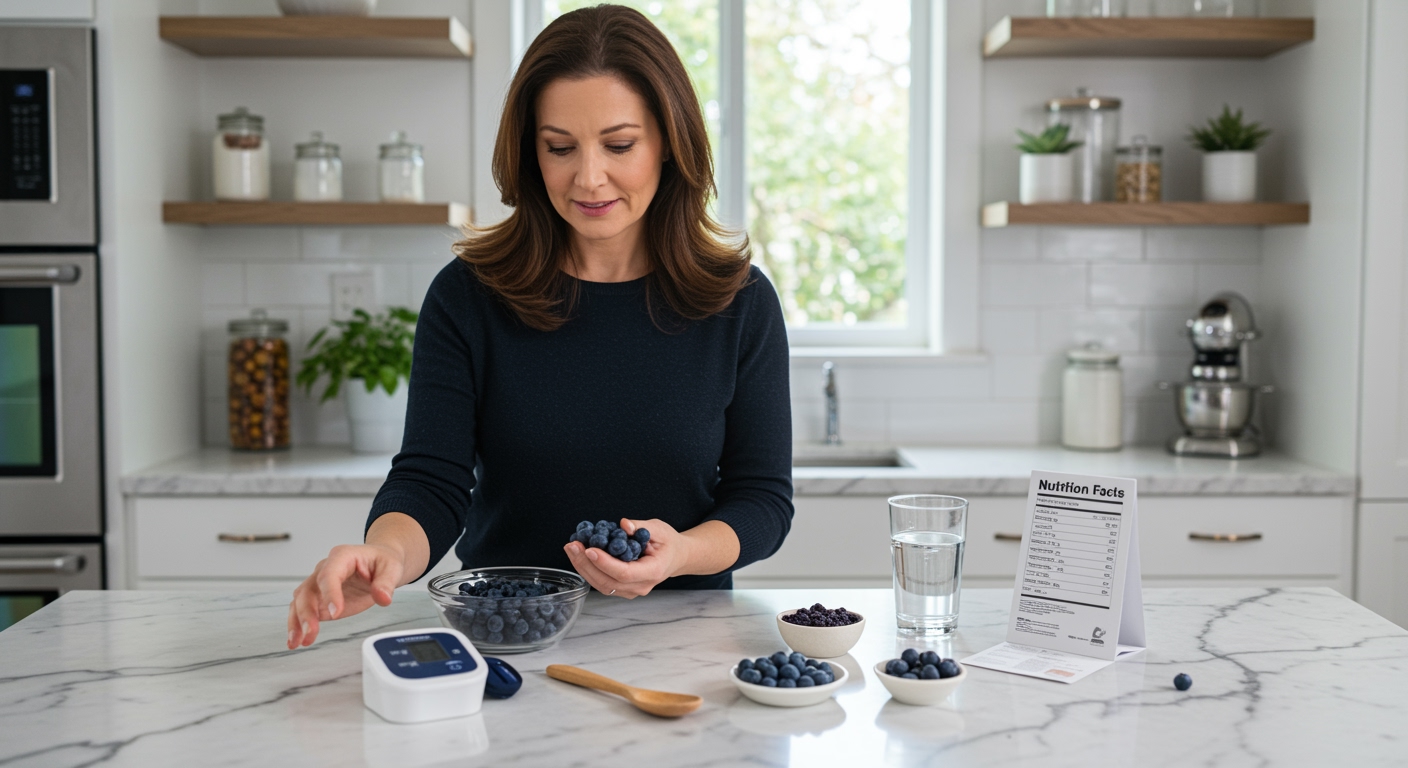✪ Key Takeaway: Blueberries can help normalize blood pressure but may cause further drops in people with already low levels.
Introduction
Your doctor just told you that your blood pressure runs low and now you wonder about every food choice.
You might be asking this question because you love blueberries but worry they could make your low blood pressure even worse.
Hi, I am Abdur, your nutrition coach and today I am going to explain exactly how blueberries affect low blood pressure and what you need to know to make smart choices.
How Do Blueberries Affect Blood Pressure?
Blueberries contain powerful compounds called anthocyanins that give them their deep blue color.
These anthocyanins work by improving the function of your blood vessel walls and helping them relax more easily.
When blood vessels relax, blood flows more smoothly and pressure naturally decreases.
Research shows that people who eat blueberries regularly experience an average blood pressure reduction of 4-6 mmHg systolic and 2-3 mmHg diastolic.
This effect happens because anthocyanins increase nitric oxide production in your blood vessels.
Nitric oxide acts like a natural signal that tells your blood vessels to widen and relax.
✪ Fact: Just one cup of blueberries contains over 80 mg of anthocyanins, enough to trigger measurable blood vessel changes.
What Happens When You Already Have Low Blood Pressure?
Low blood pressure, also called hypotension, means your readings consistently fall below 90/60 mmHg.
When you already have low blood pressure, adding foods that further reduce pressure can create problems.
You might experience dizziness, fatigue, or even fainting spells if your pressure drops too much.
However, the blood pressure lowering effect of blueberries is mild and gradual, not sudden or dramatic.
Most people with mild low blood pressure can still enjoy blueberries without significant issues.
The key is paying attention to how you feel after eating them and monitoring your symptoms carefully.
✪ Note: People with severe hypotension should consult their doctor before adding large amounts of blueberries to their diet.
Are There Benefits Beyond Blood Pressure?
Blueberries offer numerous health benefits that might outweigh concerns about blood pressure effects.
They contain high levels of vitamin C, which supports your immune system and helps your body absorb iron better.
The antioxidants in blueberries protect your cells from damage and may reduce inflammation throughout your body.
Studies show that regular blueberry consumption improves brain function and memory, especially in older adults.
Blueberries also provide fiber that supports healthy digestion and helps stabilize blood sugar levels.
For people with low blood pressure, these additional benefits might make blueberries worth including in moderate amounts.
✪ Pro Tip: Pair blueberries with protein or healthy fats to slow their absorption and minimize any blood pressure effects.
How Much Is Safe to Eat?
The amount of blueberries that affects blood pressure varies from person to person based on individual sensitivity.
Most research studies use portions ranging from half a cup to one full cup of fresh blueberries daily.
If you have low blood pressure, start with smaller portions like a quarter cup and see how you respond.
Monitor your symptoms for any increase in dizziness, weakness, or fatigue after eating blueberries.
You can gradually increase the amount if you do not experience any negative effects.
Remember that frozen and dried blueberries have similar compounds but may be more concentrated than fresh ones.
The timing of when you eat blueberries also matters – having them with meals rather than on an empty stomach provides better stability.
✪ Pro Tip: Keep a food and symptom diary to track how different amounts of blueberries affect your energy levels and wellbeing.
The Bottom Line
Blueberries can lower blood pressure through their natural compounds, which means people with already low blood pressure should eat them mindfully and in moderation.
Your body knows best – listen to its signals and adjust your portions accordingly.
I would love to hear about your experience with blueberries and blood pressure in the comments below, so please share your thoughts or questions.
References
At NutritionCrown, we use quality and credible sources to ensure our content is accurate and trustworthy. Below are the sources referenced in creating this article:
- Harvard Health: Blueberries may help lower blood pressure
- Tufts Nutrition Letter: Blueberries good for your blood pressure and brain
- Frontiers in Physiology: Blueberry anthocyanins and cardiovascular health
- PubMed: Effects of blueberry consumption on blood pressure





